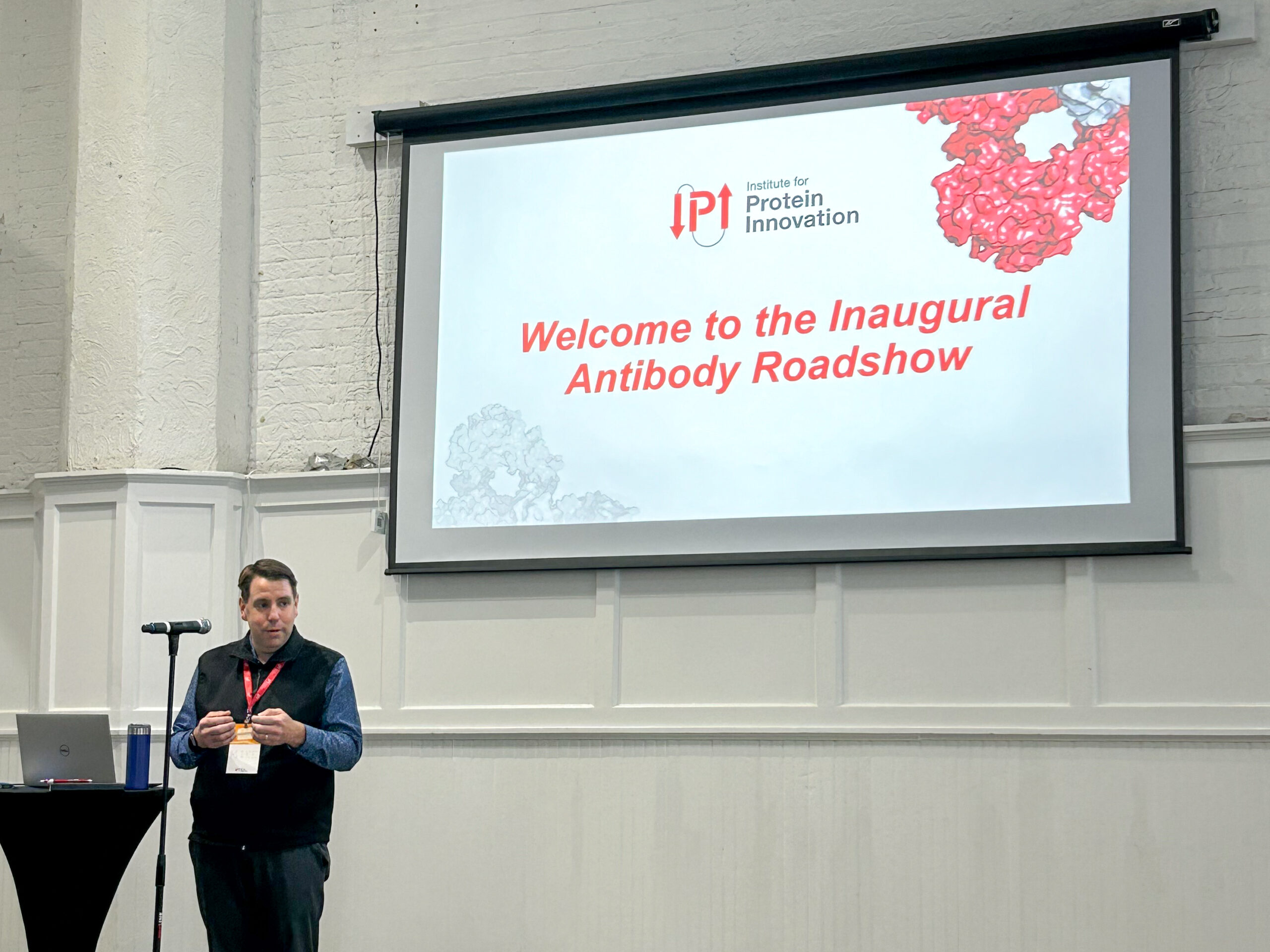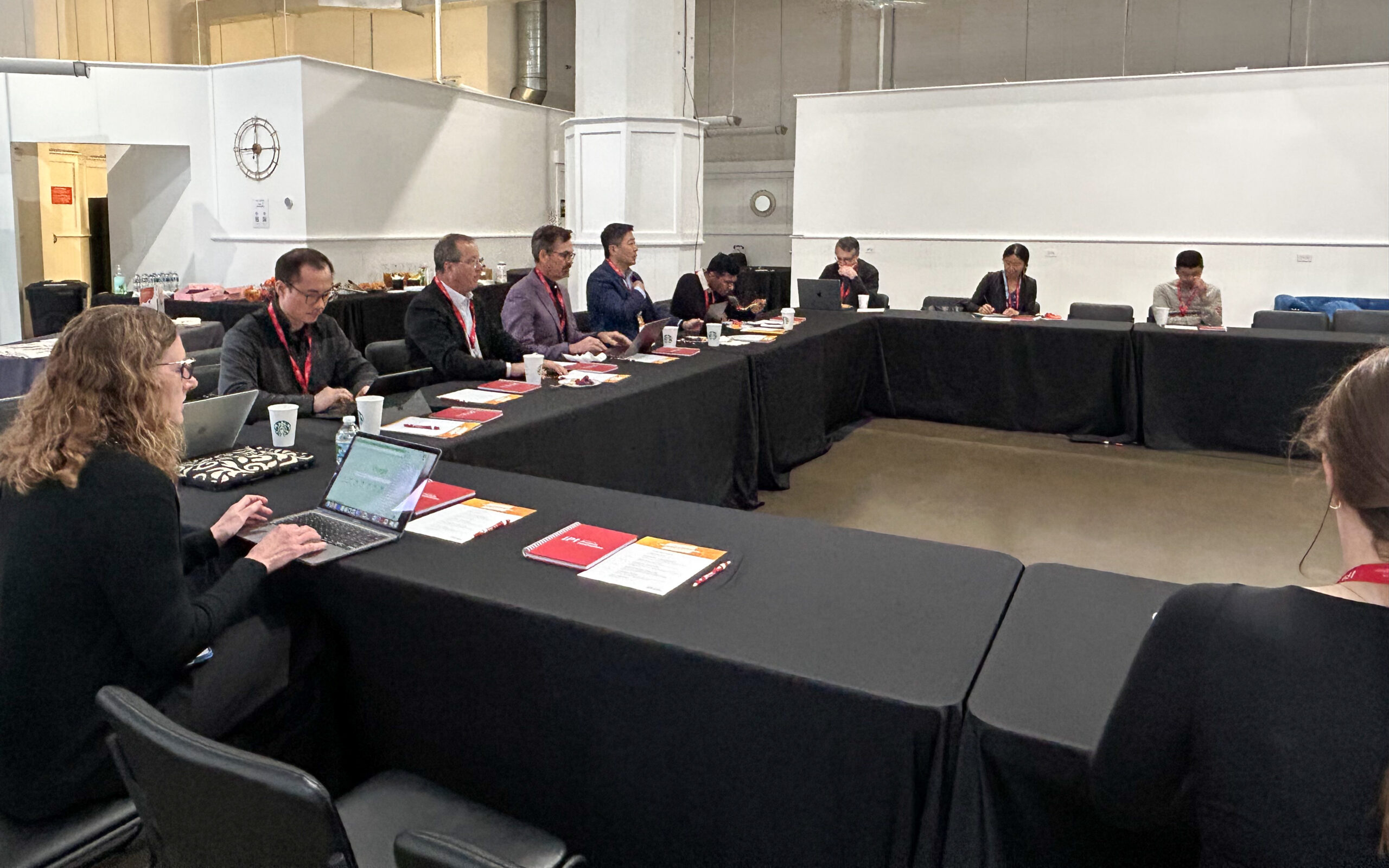The Institute for Protein Innovation (IPI) kicked off its inaugural “Antibodies Roadshow” on Saturday, October 5, during the Society for Neuroscience meeting in Chicago. The intimate workshop convened key experts in molecular neurobiology to share published and unpublished data and discuss the need for new tools, particularly antibodies, in neuronal development and synaptic molecular biology.
IPI is a nonprofit institute that supports applied protein research, tool development and educational outreach. As such, IPI recognizes gaps in providing high-quality research tools. Through events like the Antibodies Roadshow, the Institute engages the scientific community to build novel antibodies and other protein resources that address priority research questions and accelerate research.
Here are the highlights from our first-ever Roadshow:
Jason Aoto from the University of Colorado School of Medicine presented compelling validation data for IPI’s new neurexin antibodies. The targets excite neurobiology researchers because postsynaptic ligands converge on neurexins, an evolutionarily conserved family of proteins capable of bidirectional signaling. Frustratingly, there are few, if any, commercial antibodies that can identify specific neurexin family members.

Aoto showed the specificity and utility of IPI antibodies in 3D STORM imaging and demonstrated their promise compared to much more complicated V5 tagging approaches.
A surprise finding: Aoto’s work showed that antibodies are not too large to penetrate synapses, as some researchers had feared. Meanwhile, the bivalency of antibodies is worth exploring further. Because an antibody can bind two targets simultaneously (one per arm or Fab), antibodies could artificially aggregate two targets at a synapse, creating experimental artifacts that bias measurements. Some researchers want that dual binding. For those who don’t, IPI is considering monovalent binders, said Rob Meijers, head of neuroscience at IPI.
Yimin Zou from the University of California, San Diego, discussed his team’s extensive work dissecting the role of planar cell polarity (PCP), a key signaling pathway for the formation and maintenance of glutamatergic synapses. He showed that PCP protein families like Celsr, Frizzled and Prickle form an asymmetric transsynaptic complex and are required to initiate or stabilize the vast majority of glutamatergic synapses in the brain’s hippocampus and cortex. Meanwhile, another protein, Vangl2, destabilizes this complex and disassembles synapses.
Zou thanked IPI for the valuable resources it is creating for the community; his lab has recently joined the efforts to validate and test IPI antibodies against cell surface proteins.
Matthew Dalva from Tulane University presented elegant work explaining how the transsynaptic organizing receptor family, EphB, regulates NMDA receptor localization and function at synapses. Dalva found that this EphB-mediated regulation of NMDA receptors occurs through an extracellular phosphorylation event, suggesting extracellular tyrosine kinase activity. This extracellular phosphorylation mechanism, he proposed, represents a novel signaling pathway that could be targeted to restore NMDA receptor function in neurological disorders like Alzheimer’s.
Meanwhile, IPI has generated antibodies to Eph receptors and their binding partners, ephrins, and is making those available to researchers for validation in their assays.
Daniel Choquet from the University of Bordeaux, CNRS, offered three sophisticated protein engineering approaches (not involving antibodies) to develop new ligands to synaptic proteins, especially for use in live imaging:
Phage display libraries to develop new small binders for postsynaptic density (PSD)-95 isoforms, ensuring specificity and minimal functional impact.

“Unnatural amino acids” and genetic code expansion to label masked epitopes in transmembrane proteins in living neurons.
Biotin acceptor peptide (AP) tag knock-in mouse model to label glutamate receptors, allowing for single-molecule tracking in brain slices.
Engin Özkan from the University of Chicago spoke about his team’s efforts to create reagents (collections of tagged extracellular proteins) and assays to help uncover interactomes in Drosophila neuronal development. Those screens illuminated two glycosylphosphatidylinositol (GPI)-anchored cell adhesion protein families, Dprs and DIPs, which are expressed across the nervous system of flies. These proteins provide specificity to neuronal connections but their precise role is not known, and Özkan reiterated the need for antibody tools for non-mammalian model organisms.
Closing the meeting, Mike Walden, IPI’s director of commercialization, emphasized that IPI’s mission includes leveraging a high-scale antibody generation platform with community engagement. He invited the neuroscience community to:
- Participate in IPI events and activities, including workshops, symposia and courses. Find upcoming events on the IPI calendar.
- Validate IPI’s antibodies in your research systems. Reach out to antibodies@proteininnovation.org to get involved.
- Spread the word about IPI within your networks and collaborations, and sign up for the IPI newsletter.
- Collaborate with IPI on projects, grant proposals or research initiatives where your expertise and platforms can contribute. Get in touch with Rob Meijers at rob.meijers@proteininnovation.org for more information.
- Offer suggestions on how IPI can better serve the needs of the neuroscience community. Send us your feedback at info@proteininnovation.org!
“The key is to actively participate in IPI’s ecosystem, leverage its capabilities and help raise awareness of its mission to advance protein science,” Walden said. “By working together, we can maximize the impact on the neuroscience community.”

Sources:
Jason Aoto, jason.aoto@cuanschutz.edu
Yimin Zou, yzou@ucsd.edu
Matthew Dalva, mdalva@tulane.edu
Daniel Choquet, daniel.choquet@u-bordeaux.fr
Engin Özkan, eozkan@uchicago.edu
Mike Walden, mike.walden@proteininnovation.org
Writer: Trisha Gura, trisha.gura@proteininnovation.org
About IPI
The Institute for Protein Innovation is pioneering a new approach to scientific discovery and collaboration. As a nonprofit research institute, we provide the biomedical research community with synthetic antibodies and deep protein expertise, empowering scientists to explore fundamental biological processes and pinpoint new targets for therapeutic development. Our mission is to advance protein science to accelerate research and improve human health. For more information, visit proteininnovation.org or follow us on social media, @ipiproteins.


